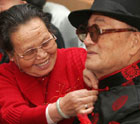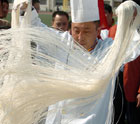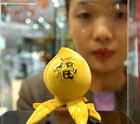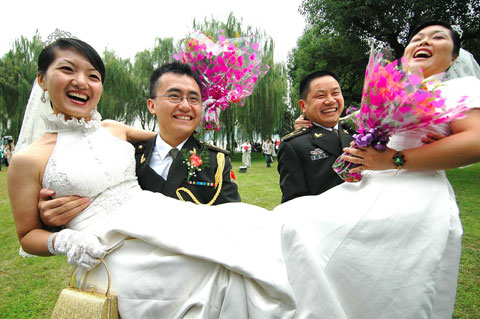With a hammer and sickle flag proudly displayed on the dashboard of his luxury car, Liu Sirong, a businessman from Guangdong Province, hopes the symbol of the Communist Party will bless him for ever.
Once a manufacturer of bargain-priced underwear, Liu first became a delegate to the CPC's national congress five years ago. He was among the first group of private businesspeople to join the CPC and attend the congress following an amendment to the Party constitution.
Before amending the Party constitution at the 16th national congress in 2002, the CPC allowed only workers, peasants, service people and intellectuals to become members.
More than 1,500 private entrepreneurs joined the CPC last year, accounting for 14.4 percent of the 10,773 members from new social strata, according to official statistics.
"I'm so proud to be able to introduce myself as a private entrepreneur," Liu said at the congress earlier this week.
The change in Liu's political status was accompanied by success in business. His Chaozhou-based Gold Tide Group, which manufactures garments, saw its revenue rise to 419 million yuan ($55.8 million) last year, up from 170 million yuan in 2002.
The 50-year-old said in an interview with Xinhua: "We would have more room to flex our muscles if we were on an equal footing with companies financed by the State."
At the 16th national congress, the CPC said it would firmly encourage, support and cultivate non-public economic sectors. As a result, some areas, which were previously barred to the private sector, are now accessible.
In 2005, the State Council enacted the first-ever documents to support and facilitate the growth of the non-public economy and pledged to grant non-public firms equal treatment.
"Over the past five years we have done things we would have never even thought about before," Liu said.
In 1994, Liu and his partners bought a village-owned factory for 4 million yuan. Gold Tide products are now sold throughout North America and Japan.
The company is now looking to diversify into making wedding gowns and other dresses.
Following a tour of Poland, Hungary and Russia, Liu said he noticed China's former Eastern bloc allies had not enjoyed the same degree of economic growth. "Our nation will be stronger and more powerful if we stick to our policy of reform and opening up."
Liu and businesspeople like him are now a thriving force in China. At the end of last year, the country had 4.94 million private businesses, worth a combined 7.5 trillion yuan. And of the CPC's 70 million members nationwide, nearly 3 million come from the private sector.
Private sector expertise has also been put to good use by national and local political consultative bodies.
In 2003, Yin Mingshan, board chairman of the Chongqing-based Lifan Group, a privately owned motorcycle producer, became the first entrepreneur to take a provincial post after being elected deputy chairman of Chongqing municipal committee of the Chinese People's Political Consultative Conference (CPPCC) - the nation's top advisory body - while in the same year, Xu Guanju, board chairman of detergent manufacturer Chuanhua Group, was elected deputy chairman of the CPPCC Zhejiang provincial committee.
Xinhua
(China Daily 10/19/2007 page6)











